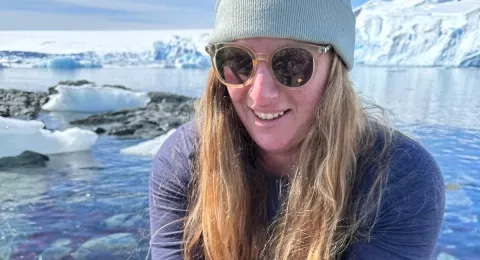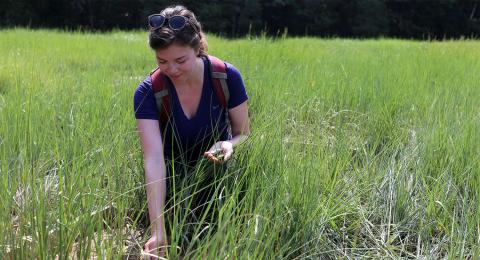Marine Biology (Ph.D.) Spotlight
Graduate Student Spotlight
Drew Villeneuve '26 , from Brunswick, ME, is a Ph.D. biological sciences: marine biology student at UNH. Drew discussed his research focused on better understanding the effects of climate change on marine ecosystems and the people who depend on them.
Learn More
Ocean Change and Species Interaction
Sophie's research topic is yet to be chosen, she plans to research how anthropogenic effects will alter organism physiology, energy allocation, and ecological dynamics in rocky intertidal ecosystems.
Learn More
Effects of environmental stressors on Eastern oysters and aquaculture
Maggie's research focuses on evaluating the effect of environmental stressors on Eastern oysters and potential impacts on aquaculture
Learn More
Water quality and ecological forecasting in the Great Bay Estuary, NH
Through Wilton's dissertation research, she will examine how the abiotic and biotic water quality parameters in the Great Bay Estuary in NH have changed in the past two to three decades.
Learn More
Marine protected areas as tools for climate change mitigation and the assessment of ecosystem vulnerability to anthropogenic and climate-driven changes
The overarching aim of my research is to assess the conservation value of marine protected areas (MPAs), with a particular focus on their role in mitigating climate change and their susceptibility to global environmental changes.
Learn More
Coastal Restoration Monitoring and Success
Alexandria's research aims to enhance techniques used to monitor coastal restoration efforts in both temperate salt marshes and tropical mangrove forests.
Learn More
Mitigation of diet-induced inflammation in fish
Aubrey Dissinger's current research focuses on the effects of soybean meal based diets on the intestinal health of fish and methods of mitigating diet-induced inflammation.
Learn More
Movement and diet ecology of top consumers in coastal New England
Using acoustic telemetry, stomach contents analyses, and metrics of marine biodiversity, my research investigates what the diets and movements of two iconic top consumers—Atlantic cod and striped bass—might tell us about ecosystem dynamics in coastal New England.
Learn More
Quantifying Microplastic Pollution in Living and Non-Living Estuarine Resources of Two Gulf of Maine Estuaries
This study will provide baseline data as well as an experiment on ambient levels of MP in estuarine waters and representative living resources of Great Bay and Casco Bay Estuaries.
Learn More
Using ‘omics techniques to investigate a novel Gulf of Maine phytoplankton bloom
Madison's research focuses on a geographically extensive and dense, weeks-long bloom of the dinoflagellate, Tripos muelleri that occurred throughout the GoME in summer 2023.
Learn More
Shellfish, Harmful Algal Blooms, and Climate Change
Hannah' is examining on how changes in climate will alter interactions between commercially valuable shellfish and phytoplankton that cause harmful algal blooms.
Learn More
Enhancing Salt Marsh Resilience Through Sediment and Bivalve Restoration
Marjorie Mednikova is a wetland ecologist researching salt marsh restoration throughout New England.
Learn More












